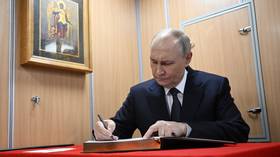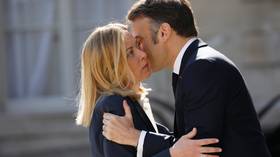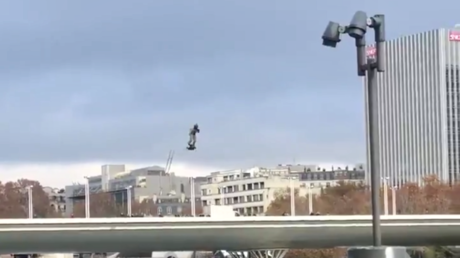Ukraine parliament backs Poroshenko’s 30-day martial law in Russia border areas after Kerch standoff
Ukraine's parliament has voted for President Petro Poroshenko’s decree on a month-long martial law after the country’s vessels faced off with Russian ships near Crimea. It affects areas bordering Russia, on both sea and land.
Martial law will be imposed on the Ukrainian territories bordering Russia, as well as along the coast of the Black and Azov Seas. It is scheduled to enter into force on November 28 and will remain in place for 30 days.
The Ukrainian army was put on full combat alert even before the martial law was declared, and media said partial troop mobilization has begun.
#Ukraine army on full combat alert after #Azov sea standoff with Russia https://t.co/SDNdkK5N1U
— RT (@RT_com) November 26, 2018
While calling on the parliament to support his decree, Poroshenko used the idea of an alleged Russia’s “ground invasion.” Citing what he called a “secret intelligence document,” he said it could happen any moment and posed a great threat to Ukraine’s security. Later, the president vowed to lift the martial law if the “invasion” does not happen.
An earlier version of the decree actually involved imposing martial law on the whole territory of Ukraine for at least two months. It also specifically stated that the people’s right “to elect and be elected” might be suspended under martial law, effectively meaning that the government can call off any elections as long as the measure is in place.
The move has been seen by some as potentially beneficial for Poroshenko. The president’s rating is falling as he struggles to campaign for re-election in March, mired by unpopular economic measures and corruption scandals in his government.
Also on rt.com Black Sea standoff: Kiev’s ‘provocation’ aims to score political points ahead of elections – MoscowFacing a public outcry over the possible fate of the upcoming elections, the president suggested that lawmakers approve martial law for 30 rather than 60 days, so as to avoid derailing the March vote. It leaves the options open for restricting the freedom of press in the selected areas on Russia's border, and showcases Poroshenko’s ties to the Ukrainian military – his election slogan being none less than “Army, Language, Religion.”
The Ukrainian leadership apparently seeks to “score political points” ahead of the March 2019 presidential elections, Russian Foreign Minister Sergey Lavrov said on the issue. Kremlin spokesman Dmitry Peskov also described the decision to impose the martial law as “an electoral intrigue.”
The move comes on the back of a standoff between a group of Ukrainian Navy ships, which crossed into Russian territorial sea without authorization, and the Russian border guard vessels.
The Ukrainian ships were sailing between two of the country’s ports: from Odessa in the Black Sea to Mariupol in the Azov Sea. The only waterway connecting these ports is through the Kerch Strait between Crimea and mainland Russia.
MOMENT Russian Coast Guard ship chases & rams into Ukrainian vessel violating territorial watersREAD MORE: https://t.co/mRY9keh4skpic.twitter.com/wSYYUUKzsE
— RT (@RT_com) November 26, 2018
Although both Russia and Ukraine have freedom of navigation in the Kerch Strait under a 2003 treaty, there are detailed technical rules on how vessels should pass through the narrow, complex waterway. Every ship passing through it should contact the Crimean sea port of Kerch, which controls traffic in the area.
While Kiev says that it notified the Russian side about its ships sailing through the area in advance, Moscow denies it received any warning. Moscow then accused Kiev of staging a planned provocation aimed at stirring up the conflict between the two neighbors and justifying the imposition of martial law.
Think your friends would be interested? Share this story!














